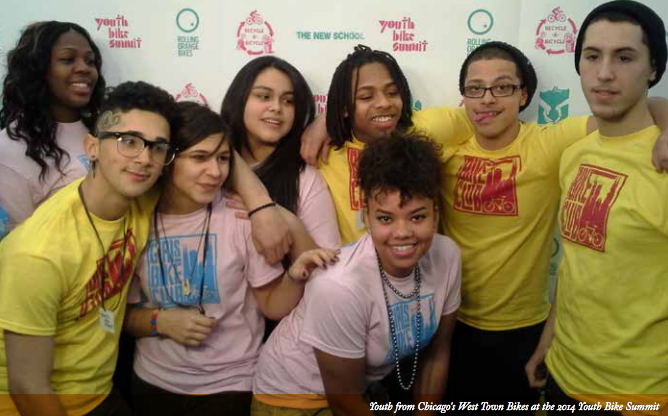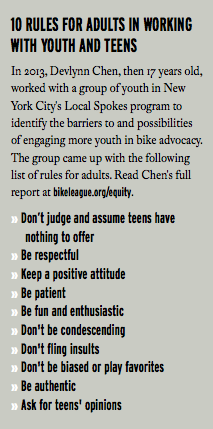DISCOVER YOUR LOCAL BICYCLING COMMUNITY
Find local advocacy groups, bike shops, instructors, clubs, classes and more!
Youth Leaders: The Future is Now
This National Bike Month, we’re asking, “With so many reasons to ride, what’s yours?” We’re listening to and highlighting your reasons here, and we’re also looking at the people, places and policies answering that question from our Winter magazine. This, written by Carolyn Szczepanski, looks at the powerful Youth Bike movement and the importance of youth voices.
From the streets to the Statehouse, social change isn’t just the domain of adults.
Aided by the rise of social media and standing on the shoulders of youth movements for civil rights, young people are rocking the vote and rethinking how our communities can work for everyone. And many of them see bikes as a transformative tool. Recognizing that power and potential, the Youth Bike Summit has evolved from a single event to a national movement in just five years. It’s not only united thousands of diverse and dynamic individuals and organizations, but started a dialog about the way we view bike advocacy and movement leadership. Instead of being a token voice or an inviting image for a campaign brochure, young people are being empowered by Youth Bike leaders to create their own initiatives and inform advocacy work from their own unique experiences.

Take Bikes Not Bombs (BNB) in Boston. “Many of our youth employees come from low-income neighborhoods where there is no bike infrastructure, and many of them have asked ‘Why are there no bike shops in Dorchester?’ ‘What is the relationship between gentrification and bike infrastructure in my neighborhood’” said Charlotte Fagan, BNB’s International Programs Coordinator. “They started Bicyclists Organizing for Community Action (BOCA) to address these questions.”
BOCA attends town meetings and started a mobile bike shop — but that’s not all. “They also connect their bike organizing and advocacy work with other wider struggles that are relevant to them as young people,” Fagan added. “They organize around youth jobs, youth transportation, as well as work with local organizations around urban farming and climate change. They see all these issues as connected, and see the intersections between bike work and other social justice work. Their work is truly innovative and is revolutionizing how we, Bikes Not Bombs, and the wider community of cyclists in Boston see who are the bike advocates of the future.”
 Pasqualina Azzarello, a co-founder of the Youth Bike Summit, couldn’t agree more. “I think it can be easy in this line of work to become too bike-focused,” she said. “At Youth Bike we try to stay focused on what the bicycle can mean for individuals, families, communities, and the planet at large. Framing conversations and campaigns around health and wellbeing, affordable and accessible transportation and mobility, job training and job placement, saving money, and even the joy of cycling, we find we’re better able to reach new bike riders and to more effectively engage existing leaders.”
Pasqualina Azzarello, a co-founder of the Youth Bike Summit, couldn’t agree more. “I think it can be easy in this line of work to become too bike-focused,” she said. “At Youth Bike we try to stay focused on what the bicycle can mean for individuals, families, communities, and the planet at large. Framing conversations and campaigns around health and wellbeing, affordable and accessible transportation and mobility, job training and job placement, saving money, and even the joy of cycling, we find we’re better able to reach new bike riders and to more effectively engage existing leaders.”
And existing — young — leaders are already in our midst, if we’re willing to make shifts to accommodate their insight in meaningful ways.
“It can certainly require some coordination to schedule a conference call that includes high school students living in four different time zones, let alone running entire programs with youth affiliated with different organizations across a number of different states,” Azzarello said. “But we’ve learned that by working together, we are more than the sum of our parts.”
“We encourage bike advocates and industry leaders to recognize that youth are not simply ‘the future of our movement’ but are a present, active, and valuable asset to the movement as we know it today,” she added. “When policies and infrastructure consider the safety and participation of youth, our communities are safer and more livable for all people who share our streets.”
Read more on this topic in our recent report, From Groupthink to Democracy in the Bike Movement, and in our 2013 report from Devlynn Chen, Engaging Youth in Bike Advocacy, at bikeleague.org/equity.